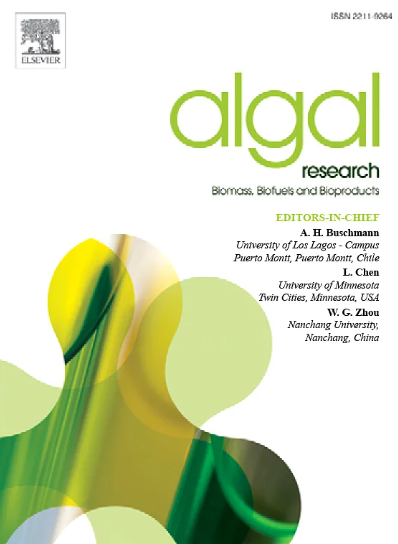Marine algae oligosaccharides: Eco-friendly elicitors for sustainable agriculture
IF 4.6
2区 生物学
Q1 BIOTECHNOLOGY & APPLIED MICROBIOLOGY
Algal Research-Biomass Biofuels and Bioproducts
Pub Date : 2025-05-11
DOI:10.1016/j.algal.2025.104093
引用次数: 0
Abstract
With an increasing demand for agricultural production to meet global needs, the emphasis is on enhancing crop yields over expansion on arable farming lands. Traditional methods to combat plant diseases involving fungicides, bactericides, and insecticides have raised concerns due to their adverse effects on health and the environment. Consequently, there is an urgent need for novel and environmentally friendly approaches to control plant diseases. Elicitors are defined as substances that stimulate the production of specific bioactive components. These compounds, when applied in small quantities, activate plant defense mechanisms. Seaweeds, classified into three major groups, play crucial roles in marine ecosystems and have great economic significance. Among the aquatic flora, these marine algae are especially notable for their high content of marine algae polysaccharides (MAP), including carrageenan, alginate, fucoidan, laminaran, agarose and ulvan that have been reported to act as elicitors of plant defenses. When hydrolyzed, MAPs yield marine algae oligosaccharides (MAOs), which garnered more significant interest in recent years because of their superior solubility. This review presents a holistic view of seaweeds as natural elicitors, primarily focusing on MAPs and MAOs in enhancing the defensive capabilities of plants. We discuss various methodologies deployed to process MAOs from MAPs, and provide a comprehensive comparison of their efficacies. Further, we explore their application regimens of as elicitors for plant defense, particularly in the context of sustainable agriculture.
海藻低聚糖:可持续农业生态友好型激发剂
随着对农业生产的需求不断增加以满足全球需求,重点是提高作物产量而不是扩大耕地面积。防治植物病害的传统方法包括杀菌剂、杀菌剂和杀虫剂,由于它们对健康和环境的不利影响,引起了人们的关注。因此,迫切需要新的和环境友好的方法来控制植物病害。激发子被定义为刺激产生特定生物活性成分的物质。当少量使用这些化合物时,可以激活植物的防御机制。海藻在海洋生态系统中起着至关重要的作用,具有重要的经济意义。在水生植物群中,这些海藻尤其以其高含量的海藻多糖(MAP)而闻名,包括卡拉胶、藻酸盐、岩藻聚糖、层聚糖、琼脂糖和ulvan,这些多糖被报道为植物防御的激发剂。当水解时,MAPs产生海洋藻类低聚糖(MAOs),近年来由于其优越的溶解度而引起了更大的兴趣。本文综述了海藻作为天然激发子的整体观点,重点介绍了map和MAOs在增强植物防御能力方面的作用。我们讨论了用于处理来自map的mao的各种方法,并对它们的效率进行了全面的比较。此外,我们探讨了它们作为植物防御激发子的应用方案,特别是在可持续农业的背景下。
本文章由计算机程序翻译,如有差异,请以英文原文为准。
求助全文
约1分钟内获得全文
求助全文
来源期刊

Algal Research-Biomass Biofuels and Bioproducts
BIOTECHNOLOGY & APPLIED MICROBIOLOGY-
CiteScore
9.40
自引率
7.80%
发文量
332
期刊介绍:
Algal Research is an international phycology journal covering all areas of emerging technologies in algae biology, biomass production, cultivation, harvesting, extraction, bioproducts, biorefinery, engineering, and econometrics. Algae is defined to include cyanobacteria, microalgae, and protists and symbionts of interest in biotechnology. The journal publishes original research and reviews for the following scope: algal biology, including but not exclusive to: phylogeny, biodiversity, molecular traits, metabolic regulation, and genetic engineering, algal cultivation, e.g. phototrophic systems, heterotrophic systems, and mixotrophic systems, algal harvesting and extraction systems, biotechnology to convert algal biomass and components into biofuels and bioproducts, e.g., nutraceuticals, pharmaceuticals, animal feed, plastics, etc. algal products and their economic assessment
 求助内容:
求助内容: 应助结果提醒方式:
应助结果提醒方式:


